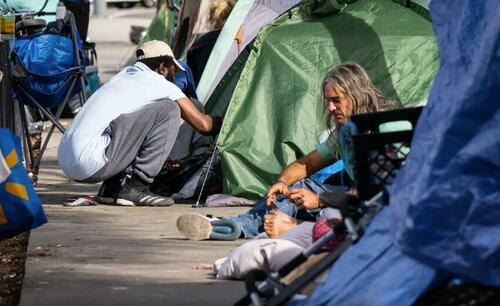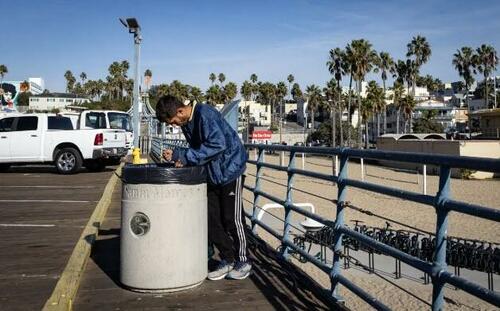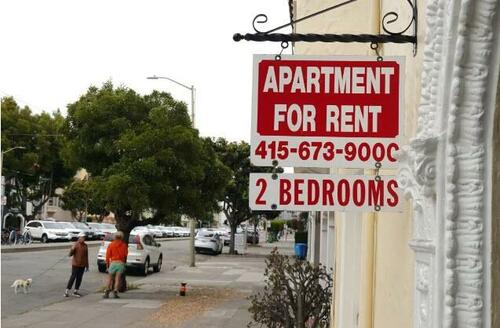I'm curious how other nations resolve this problem.
There are always the chronic homeless, those who probably belong in institutions and cannot function in society. But I'm concerned about the people who, due to sudden job losses, inflation, housing unaffordability, spousal abuse, divorce, etc end up on the streets. They are otherwise functioning people. Unaffordable housing in exploding in the US. Easy to blame the landlord, but I personally am not jacking up rents, and in fact I've held rents firm despite inflation, so how to we keep people off the streets?
 www.zerohedge.com
www.zerohedge.com
Homelessness has risen sharply in the United States, with a report from House and Urban Development (HUD) indicating that around 653,000 people were homeless, the highest number on record.

Inflation combined with the end of pandemic-era protections against eviction were the key culprits identified in the HUD report, released on Dec. 15. Another major factor noted in the report was the housing supply crunch.
HUD's annual 2023 Point-in-Time Count, which measured homelessness on a single night in January 2023, showed a 12 percent rise in homelessness (or by 70,650 individuals) compared to a year earlier. This sent the total to 653,104 homeless people, the highest since the agency launched the point-in-time gauge in 2007.
"For those on the frontlines of this crisis, it’s not surprising. People across the country are struggling to pay skyrocketing rents," Ann Olivia, CEO of the National Alliance to End Homelessness, said in a statement.
The sharpest rise in homelessness was among people in families with children—this measure rose by 15.5 percent. Next was homelessness among unaccompanied youths, which increased by 15.3 percent.
Former Arizona gubernatorial candidate Kari Lake, who is running for the U.S. Senate, blamed President Joe Biden's policies for fueling homelessness.
"In Joe Biden's America, it's almost impossible to pay rent or afford a home,"she wrote in a post on X while pledging to address chronic street homelessness if elected in 2024.

A homeless man looks for food in a trash can in Santa Monica, Calif., on Dec. 8, 2023. (John Fredricks/The Epoch Times)
The jump in first-time homelessness is likely due to a combination of factors, HUD said, including rent hikes and the winding down of pandemic-era protections and programs focused on preventing evictions and housing loss.
The record-setting homelessness came on the heels of steep rent increases combined with stagnant renter household incomes. An analysis of Census Bureau data by the Center on Budget and Policy Priorities (CBPP) shows that the median rent rose by an inflation-adjusted 18.8 percent between 2001 and 2022, while median renter household income rose by 4.3 percent within the same time frame.
A Moody’s Analytics U.S. State of Rent Burden report earlier this year found that most renters now spend more than a third of their monthly income on rent, which it labels “rent burdened.”

A sign is posted in front of an apartment building with available rentals in San Francisco, on June 9, 2023. (Justin Sullivan/Getty Images)
The CEO of the National Alliance to End Homelessness called for "urgent and overdue investments in affordable housing and rental assistance," along with more funding for housing support services to help homeless people find permanent housing quickly.
Ms. Lake's policy proposal to fix the homeless crisis includes banning urban camping while providing federal lands and funding for controlled camping and shelter facilities to get people off city streets.
She has also pledged to rebuild the nation's system of in-patient treatment centers, halfway houses, and assisted-living facilities to help treat the most seriously addicted and mentally deranged individuals.
"I don't believe that God intended for anyone to rot on the streets," Ms. Lake said in a statement. "In the Senate, I will work to rebuild our economy from the damage of Bidenomics & tackle the homelessness crisis."
Diane Yentel, president and CEO of the National Low Income Housing Coalition, called for more federal investment to make housing more affordable.
"Without significant and sustained federal investments to make housing affordable for people with the lowest incomes, the affordable housing and homelessness crises in this country will only continue to worsen," Ms. Yentel said in a statement.
According to the Bureau of Labor Statistics, the shelter index within the Consumer Price Index (CPI) continued to rise in November. It rose in month-over-month terms by 0.4 percent—and 6.5 percent in year-over-year terms.
In fact, the rise in the shelter index was the single biggest factor in the monthly increase for the overall CPI index, with the exception of food and energy.
A housing shortage in the United States and higher interest rates that have driven more people to rent have led cities and states to pursue rent control.
Arizona, Florida, Hawaii, Georgia, Illinois, Kentucky, and Massachusetts are among states considering proposals to add rent control. In response, landlord advocates say rent ceilings do not bring down prices.
Alexandra Alvarado, director of education for the 145,000-member American Apartment Owners Association (AAOA), told The Epoch Times that some of her members have found that rent control has actually helped cause them to increase rates more often.
“We have members who had very rarely raised rents but who are now raising them to the (rent control) cap each year so they don’t fall behind,” she said. “They’re never going to skip a year. It’s contradictory, but I think for our members, there have actually been more rent increases since rent control.”
There are always the chronic homeless, those who probably belong in institutions and cannot function in society. But I'm concerned about the people who, due to sudden job losses, inflation, housing unaffordability, spousal abuse, divorce, etc end up on the streets. They are otherwise functioning people. Unaffordable housing in exploding in the US. Easy to blame the landlord, but I personally am not jacking up rents, and in fact I've held rents firm despite inflation, so how to we keep people off the streets?
Homelessness Soars To Record High In America | ZeroHedge
ZeroHedge - On a long enough timeline, the survival rate for everyone drops to zero
Homelessness Soars To Record High In America
Authored by Tom Ozimek via The Epoch Times,Homelessness has risen sharply in the United States, with a report from House and Urban Development (HUD) indicating that around 653,000 people were homeless, the highest number on record.

Inflation combined with the end of pandemic-era protections against eviction were the key culprits identified in the HUD report, released on Dec. 15. Another major factor noted in the report was the housing supply crunch.
HUD's annual 2023 Point-in-Time Count, which measured homelessness on a single night in January 2023, showed a 12 percent rise in homelessness (or by 70,650 individuals) compared to a year earlier. This sent the total to 653,104 homeless people, the highest since the agency launched the point-in-time gauge in 2007.
"For those on the frontlines of this crisis, it’s not surprising. People across the country are struggling to pay skyrocketing rents," Ann Olivia, CEO of the National Alliance to End Homelessness, said in a statement.
The sharpest rise in homelessness was among people in families with children—this measure rose by 15.5 percent. Next was homelessness among unaccompanied youths, which increased by 15.3 percent.
Former Arizona gubernatorial candidate Kari Lake, who is running for the U.S. Senate, blamed President Joe Biden's policies for fueling homelessness.
"In Joe Biden's America, it's almost impossible to pay rent or afford a home,"she wrote in a post on X while pledging to address chronic street homelessness if elected in 2024.

A homeless man looks for food in a trash can in Santa Monica, Calif., on Dec. 8, 2023. (John Fredricks/The Epoch Times)
More Details
The rise in homelessness was driven mostly by a sharp increase in the number of people experiencing homelessness for the first time, according to HUD. Between fiscal years 2021 and 2022, the number of people who became newly homeless soared by 25 percent.The jump in first-time homelessness is likely due to a combination of factors, HUD said, including rent hikes and the winding down of pandemic-era protections and programs focused on preventing evictions and housing loss.
The record-setting homelessness came on the heels of steep rent increases combined with stagnant renter household incomes. An analysis of Census Bureau data by the Center on Budget and Policy Priorities (CBPP) shows that the median rent rose by an inflation-adjusted 18.8 percent between 2001 and 2022, while median renter household income rose by 4.3 percent within the same time frame.
A Moody’s Analytics U.S. State of Rent Burden report earlier this year found that most renters now spend more than a third of their monthly income on rent, which it labels “rent burdened.”

A sign is posted in front of an apartment building with available rentals in San Francisco, on June 9, 2023. (Justin Sullivan/Getty Images)
The CEO of the National Alliance to End Homelessness called for "urgent and overdue investments in affordable housing and rental assistance," along with more funding for housing support services to help homeless people find permanent housing quickly.
Ms. Lake's policy proposal to fix the homeless crisis includes banning urban camping while providing federal lands and funding for controlled camping and shelter facilities to get people off city streets.
She has also pledged to rebuild the nation's system of in-patient treatment centers, halfway houses, and assisted-living facilities to help treat the most seriously addicted and mentally deranged individuals.
"I don't believe that God intended for anyone to rot on the streets," Ms. Lake said in a statement. "In the Senate, I will work to rebuild our economy from the damage of Bidenomics & tackle the homelessness crisis."
Diane Yentel, president and CEO of the National Low Income Housing Coalition, called for more federal investment to make housing more affordable.
"Without significant and sustained federal investments to make housing affordable for people with the lowest incomes, the affordable housing and homelessness crises in this country will only continue to worsen," Ms. Yentel said in a statement.
Rent Control?
Over the past several years, U.S. housing costs for homebuyers and renters have skyrocketed.According to the Bureau of Labor Statistics, the shelter index within the Consumer Price Index (CPI) continued to rise in November. It rose in month-over-month terms by 0.4 percent—and 6.5 percent in year-over-year terms.
In fact, the rise in the shelter index was the single biggest factor in the monthly increase for the overall CPI index, with the exception of food and energy.
A housing shortage in the United States and higher interest rates that have driven more people to rent have led cities and states to pursue rent control.
Arizona, Florida, Hawaii, Georgia, Illinois, Kentucky, and Massachusetts are among states considering proposals to add rent control. In response, landlord advocates say rent ceilings do not bring down prices.
Alexandra Alvarado, director of education for the 145,000-member American Apartment Owners Association (AAOA), told The Epoch Times that some of her members have found that rent control has actually helped cause them to increase rates more often.
“We have members who had very rarely raised rents but who are now raising them to the (rent control) cap each year so they don’t fall behind,” she said. “They’re never going to skip a year. It’s contradictory, but I think for our members, there have actually been more rent increases since rent control.”

